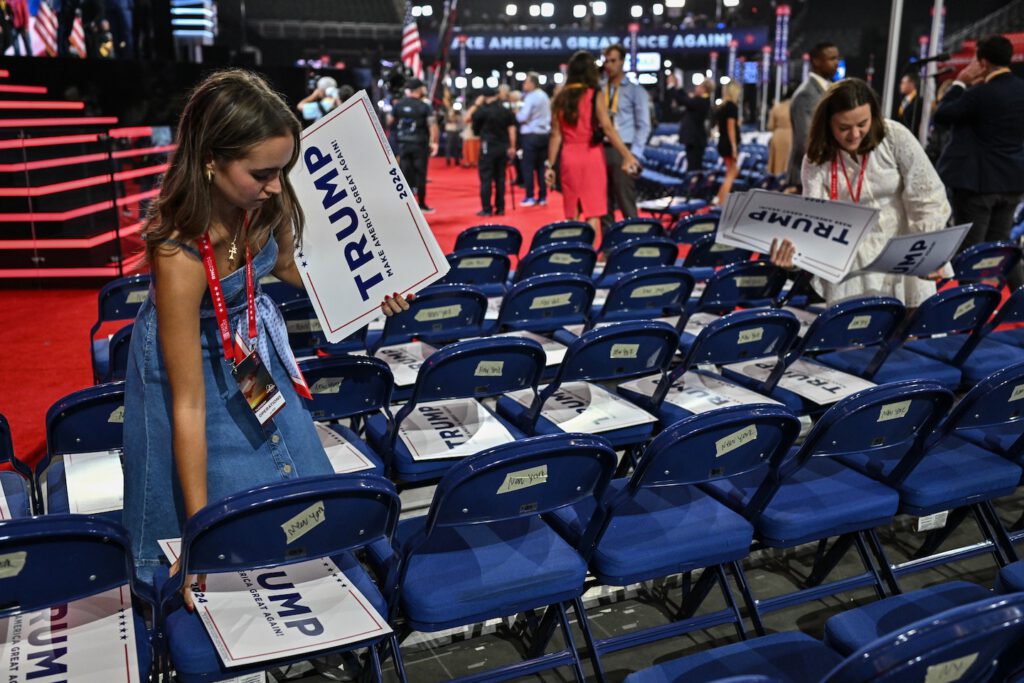Allies of former President Donald Trump have launched a series of “Manhattan Projects” to develop military technology and are drafting a sweeping AI executive order calling for an immediate review of “unnecessary and burdensome regulations,” signaling that a second Trump administration may pursue AI policies that favor Silicon Valley investors and companies.
The framework would also create an “industry-led” body to evaluate AI models and protect the systems from foreign adversaries, according to a copy of the document seen exclusively by The Washington Post. The framework, which includes a section titled “Putting America First on AI,” is a sharp departure from the Biden administration’s strategy for the burgeoning field, which issued a sweeping executive order last year using emergency powers to subject next-generation AI systems to safety testing.
The effort includes staffers from the America First Institute, a nonprofit group run by former Trump administration officials and Larry Kudlow, a former chief economic adviser to Trump, according to a person familiar with the matter, who spoke on condition of anonymity to discuss the private plans.
Ahead of the Republican National Convention in Milwaukee this week, Republicans adopted a policy platform that includes reversing Biden’s AI executive order, which some tech investors and startups say stifles innovation. The Republicans’ stance comes amid a broader political realignment in Silicon Valley, where some executives and investors who once backed President Barack Obama have turned to Trump.
“We will repeal Joe Biden’s dangerous executive orders that stifle AI innovation and impose a radical left ideology on the development of this technology,” the Republican platform states. “Instead, Republicans will support AI development that is rooted in free speech and human flourishing.”
Get caught up in
Stories to keep you up to date
The framework offers an early indication of what policies Republicans might pursue as an alternative to Biden’s executive orders.
In response to The Washington Post’s request for comment, the Trump campaign shared a link to a 2023 blog post that states that “no aspect of future presidential appointments or policy announcements should be considered official” unless they come directly from Trump or an authorized member of his campaign team.
Hilton Beckham, a spokesperson for the America First Institute, said in a statement that the document did not represent the institute’s “official position.”
“AFPI is not affiliated with or represents any candidate or campaign,” Beckham said. “We receive thousands of policy proposals from across the country every month, and this document is one example of those proposals.”
Expanded military investment in AI would likely benefit tech companies that already have Pentagon contracts, such as Anduril, Palantir and Scale, whose key executives have supported Trump and have close ties to the Republican Party.
At the same time, the conservative Heritage Foundation is also drafting a new AI policy as part of Project 2025, a blueprint for how a second Trump term could reform the federal government. The Trump campaign has distanced itself from the plan, which includes several policies aimed at promoting AI research and development in the U.S. and limiting China’s access to the technology.
In the chaotic aftermath of the assassination attempt on President Trump, leading tech executives and investors, including Tesla CEO Elon Musk and hedge fund manager Bill Ackman, have endorsed him for president. Their endorsement is the latest sign that a second Trump administration may forge a friendlier relationship with the tech industry. During his time in the White House, Trump maintained close ties with venture capitalist Peter Thiel and key executives under the former PayPal CEO, but often clashed with other tech titans over immigration policy and social media rules.
On Tuesday, venture capitalists Marc Andreessen and Ben Horowitz endorsed Trump on their podcast. They said Trump is the perfect candidate for “little tech,” a term used to describe startups that have raised millions of dollars from Andreessen Horowitz and other investors. They posted a political agenda arguing that the U.S. government has become “much more hostile to startups than it used to be” by regulating new technologies such as blockchain and AI.
The two venture capitalists said on the podcast that Trump shared his views on AI during a recent dinner with them, and that Trump had a very simple view on technology that contrasted with the Biden administration, they said.
“He told us, ‘AI is very scary, but we absolutely have to win,'” Horowitz recalled. “Because, ‘If we don’t win, China will win, and that’s a very bad world.'”
They voiced support for Andreessen’s plan to repeal the Biden AI executive order, which Andreessen said would “elevate” OpenAI and several other AI companies as monopolies and “destroy the startup ecosystem underneath.”
Mr. Trump has stepped up his outreach to Silicon Valley in recent weeks, appearing on the “All In” podcast, hosted by a group of prominent tech investors, and attending a fundraiser at the home of podcast co-host David Sachs, a former PayPal executive who spoke on Mr. Trump’s behalf at the Milwaukee convention.
During the podcast, Trump said he’d heard from “geniuses” in Silicon Valley that more energy was needed to accelerate AI development in order to compete with China.
In an on-air discussion after the interview, tech investors said Trump needs to surround himself with people who know about technology, including artificial intelligence and nuclear power. Chamath Palihapitiya, founder of venture capital firm Social Capital, said Trump’s San Francisco fundraiser shows he has greater support from the tech industry than he did in 2016.
“There are people coming up,” Mr. Palihapitiya said. “If he can figure out how to build a cabinet with these people — highly professional, thoughtful people — then he could very well change his cabinet.”
Elizabeth Dwoskin and Nitasha Tick contributed to this report.

